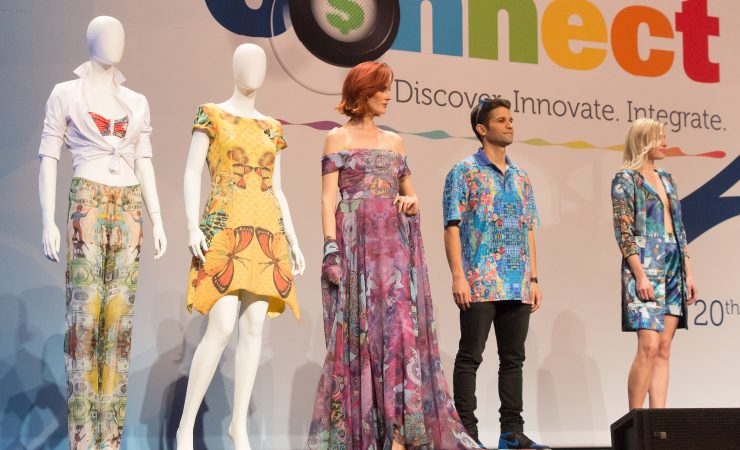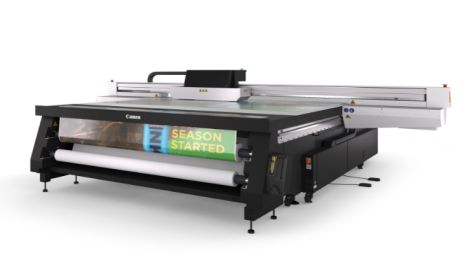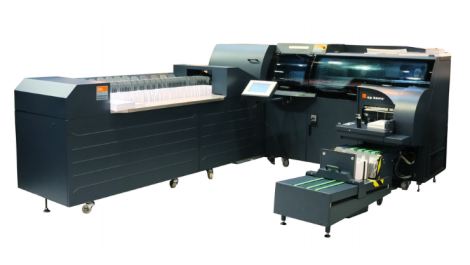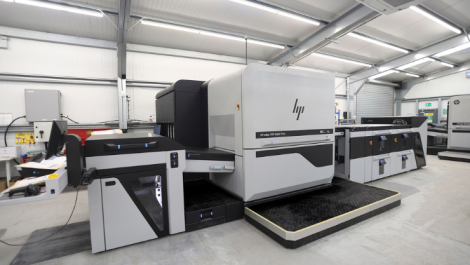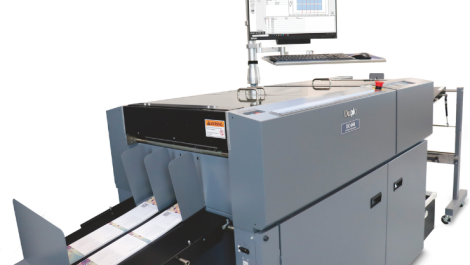Last month’s annual EFI user conference was the twentieth. It also marked the completion of new CEO Bill Muir’s first 100 days. Michael Walker was there to hear what his plans are and the company’s latest product announcements.
In his first keynote speech at Connect 2019, EFI’s 20th annual user conference, new CEO Bill Muir emphasised his commitment to “keeping the innovation engine alive and well”.
Joking to the audience of some 900 attendees – more than a quarter of whom were from outside the US – that this was Day 99 of his employment and that he was expected to take responsibility for everything from Day 100, Mr Muir focused on the accelerating rate of change that technology has brought in the last 30 years, pointing out that technology develops exponentially while businesses grow logarithmically, which can lead to a potentially dangerous “bifurcation” between a company and its customers.
While giving away nothing in terms of specific product announcements, he praised the “managerial courage” it had taken to pivot EFI’s business from the original Fiery platform via the Print Café project of the early 2000s to the company’s success in the wide-format sector in more recent years. He pointed out that the rumours of print’s demise had been exaggerated and that although the industry’s total value has yet to recover to its peak of 2007, it has been growing consistently at a compound rate of 1.5% since 2011.
Quoting a range of business leaders, including Amazon’s Jeff Bezos and more unexpectedly, Michelangelo, Mr Muir stressed that his responsibility was to help keep the innovations coming to help EFI’s customers in their businesses. By focusing on company culture and “customer obsession”, he said that the third factor that he had to worry about – capital – ‘would take care of itself’.
The theme of print being alive and well was repeated in the “fireside chat” where Mr Muir interviewed Joe Popolo, CEO of the Freeman Company, a US$3 billion firm that specialises in branding for live events, with offices in eight countries. ‘I laugh when I hear print is dead,’ said Mr Popolo, adding that his firm is producing 10 million square feet a year of print on its fleet of 17 Vutek wide format printers.

New CEO Bill Muir promises ‘more change in the next five years than in the last 30’ but to keep the innovation engine running smoothly.
State of the products
The second day of the conference included briefings on each of EFI’s product groups. CFO Marc Olin said that the display graphics part of the business, responsible for the Vutek range of wide-format printers, had seen the biggest changes in the last six years, with expansion into the entry- and mid-level sectors where sub-60in (1.5m) at ‘an approachable price’ proving successful. Products in this category include the Vutek Pro 24f flatbed and 32r roll-fed machines, while the h3/h5 hybrid (see last issue’s Product Focus for an in-depth description) is a new mid-range introduction that Mr Olin said is receiving positive customer feedback from early adopters, as is the FabriVu 340i dye sublimation textile printer which features an integrated calendar.
He reported that the packaging line – effectively the Nozomi corrugated printer, in hardware terms – was making ‘tremendous progress’ with 15 installations around the world and the first repeat orders now arriving. While EFI had aimed the printer at corrugated packaging converters, customers such as McGowan’s in Dublin and Delta Group in London are also using it for PoS; apparently one customer has adapted the unit for roll-feeding, though Mr Olin stressed that EFI doesn’t recommend that. New features for the Nozomi include the availability of white ink which can be underprinted to provide good colour reproduction on kraft board, and enhanced top-feeder for thinner materials such as types F and G flute/microflute and an enhanced pre-coater with easier maintenance and anilox roller change to extend the range of supported substrates, including nonrigid ones such as carton board.
A choice of printing modes on the Nozomi allow colour gamut, resolution and ink usage to be traded off for different applications. Photo mode, when employed on a machine with the additional orange and violet inks, can hit 97% of the Pantone spot colours, while CMYK-only PoP mode can match ISO 12647-2 offset print specification while adding a high gloss finish to mottled or non-white boards; Eco mode drops resolution and cuts colour gamut but saves ink on products where lower quality is acceptable.
Another growth area has been in textiles where the 24 months following the acquisition of Reggiani culminated in the November 2018 launch of the Bolt single-pass industrial digital textile printer, described as ‘Nozomi for textiles’ and capable of 90sqm/min, while support for up to 12 colours is said to increase both accuracy and vibrancy. The Bolt printer is complemented by the Terra pigment inks that eliminate some of the washing and drying steps required in fabric printing, saving water, energy and time. New variants on the Bolt platform will appear in 2019, with further environmental improvements.
The DFE segment is the oldest part of EFI’s business. New higher performance versions of the Fiery hardware were announced at Connect (see News, page 4), along with software-based improvements to colour accuracy and the implementation of the Fiery Driven Printroom, a unified software interface that allows operators to interrogate and manage all of EFI’s output devices, plus any third-party print engine driven by a Fiery controller, simplifying both training and production management. EFI IQ is a new Cloud-based service based on data aggregation that will be rolled out later in the year; we will report on it in due course.
Ecosystem services
The software side of the business was covered by general manager of productivity software Gaby Matsliach who explained how the “ecosystem” around the MIS and related products had been extended last year to address more specific market segments, from corrugated converters (not necessarily using digital print) to publication to enterprise versions, reflecting increased uptake of the existing Productivity Suites and a growing number of partnerships. This is backed by what Mr Matsliach called an ‘improved discovery process’, involving audit and “ecosystem consultancy” around customers’ businesses as part of the pre-sales approach. In terms of product releases, he introduced version 7 of the Productivity Suites, which will be available in the second quarter of 2019. The new features and functionality are specific to each Suite – for details of these and the extension of the MarketDirect brand to encompass EFI’s Digital StoreFront web-to-print software, see here.
Bill Muir ended his keynote with the comment that EFI customers who had repeatedly attended Connect were telling him that every year they learn something that they can take away to make their businesses better. If you couldn’t make it this year, maybe this report helps.
